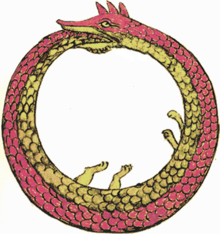
Self-reference is a concept that involves referring to oneself or one's own attributes, characteristics, or actions. It can occur in language, logic, mathematics, philosophy, and other fields.
In natural or formal languages, self-reference occurs when a sentence, idea or formula refers to itself. The reference may be expressed either directly—through some intermediate sentence or formula—or by means of some encoding.
In philosophy, self-reference also refers to the ability of a subject to speak of or refer to itself, that is, to have the kind of thought expressed by the first person nominative singular pronoun "I" in English.
Self-reference is studied and has applications in mathematics, philosophy, computer programming, second-order cybernetics, and linguistics, as well as in humor. Self-referential statements are sometimes paradoxical, and can also be considered recursive.
- ^ Soto-Andrade, Jorge; Jaramillo, Sebastian; Gutierrez, Claudio; Letelier, Juan-Carlos. "Ouroboros avatars: A mathematical exploration of Self-reference and Metabolic Closure" (PDF). MIT Press. Retrieved 16 May 2015.